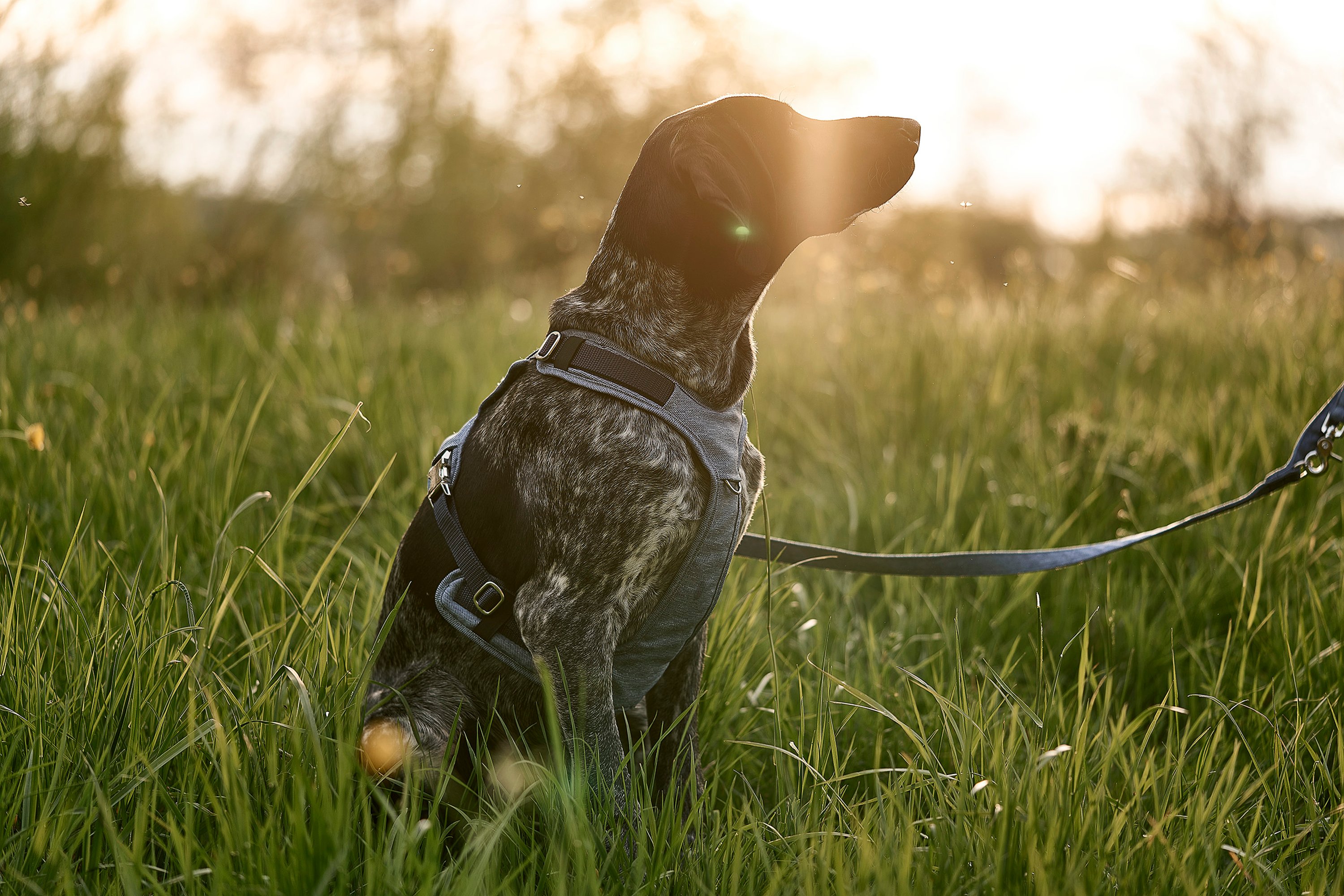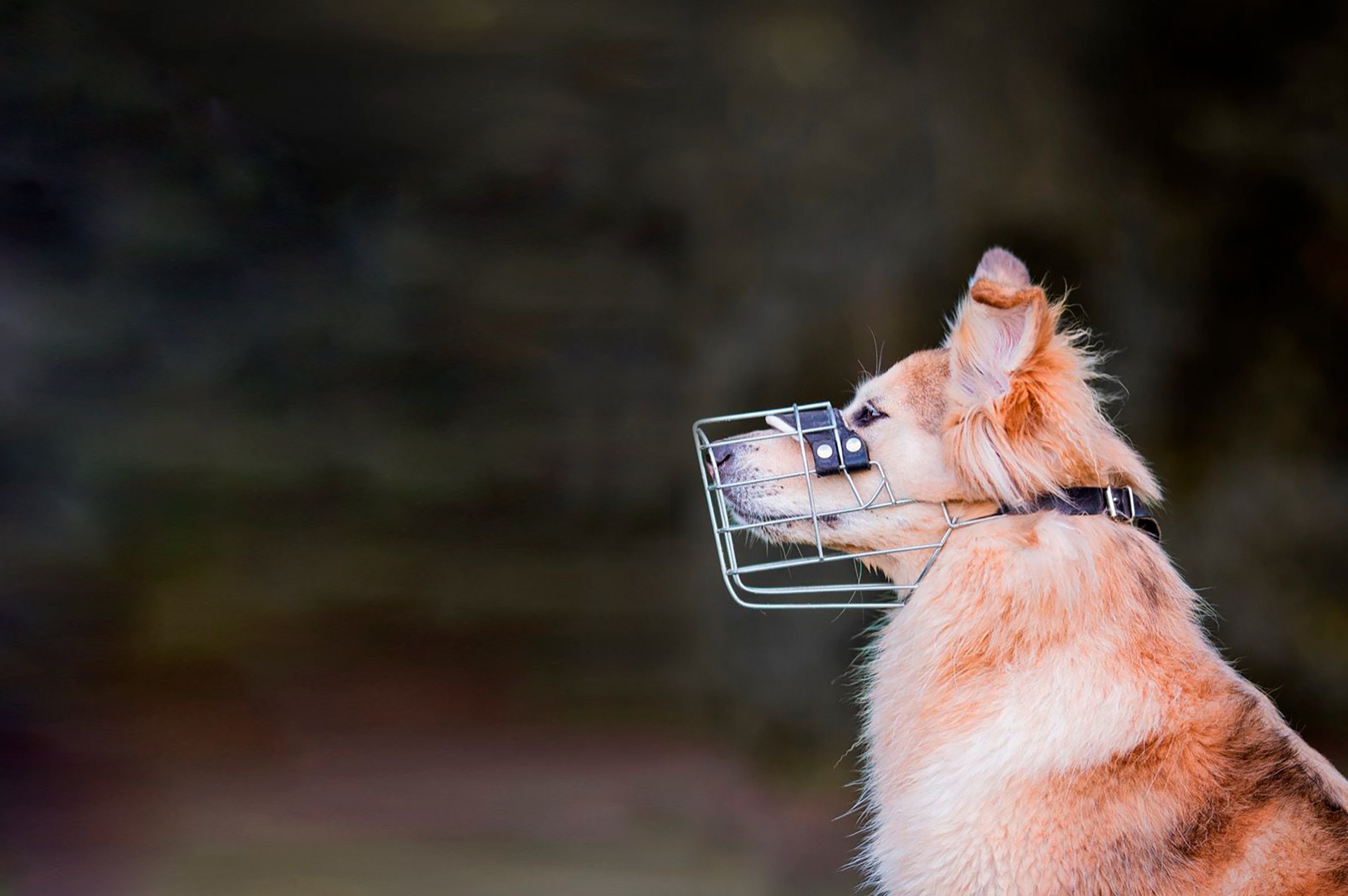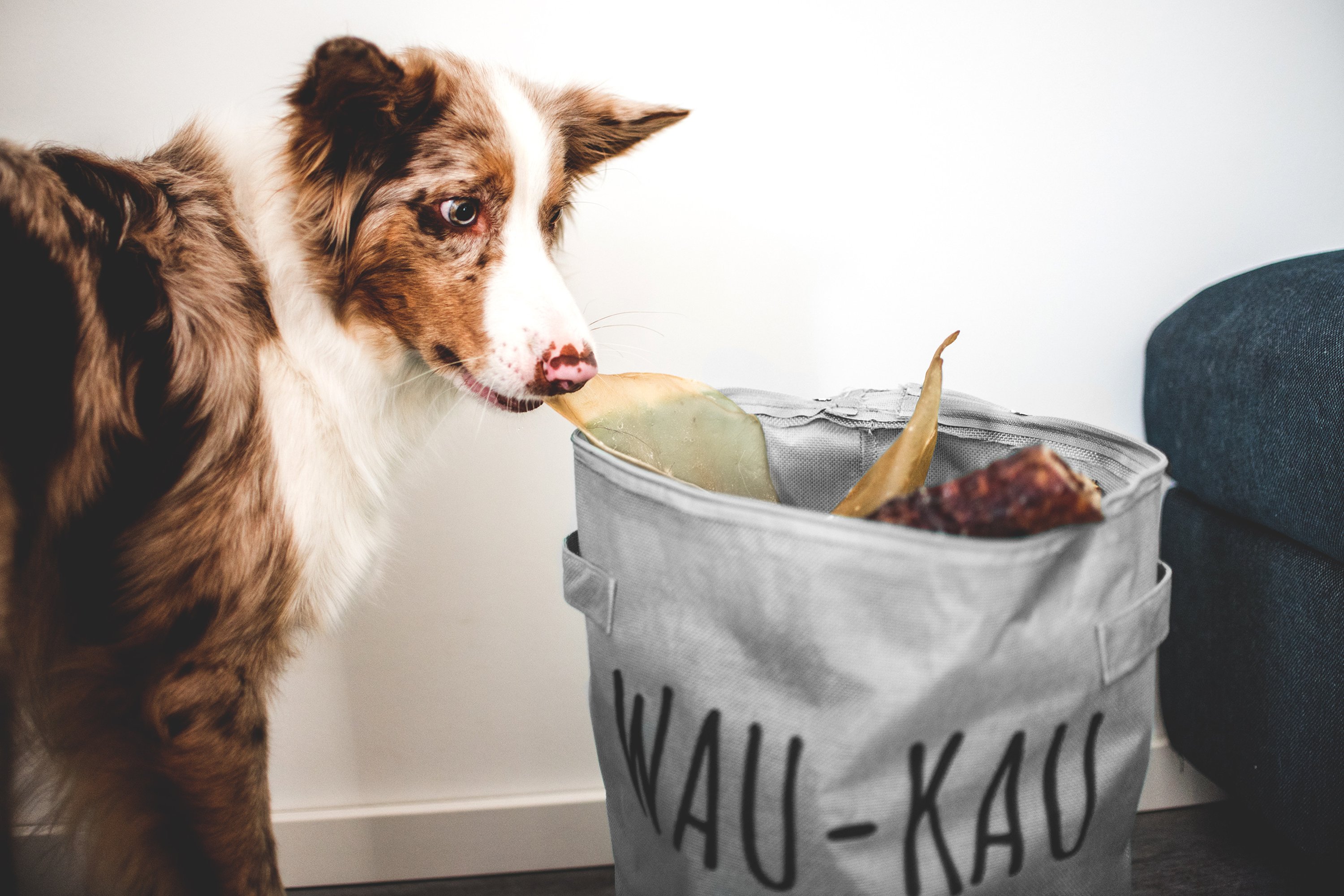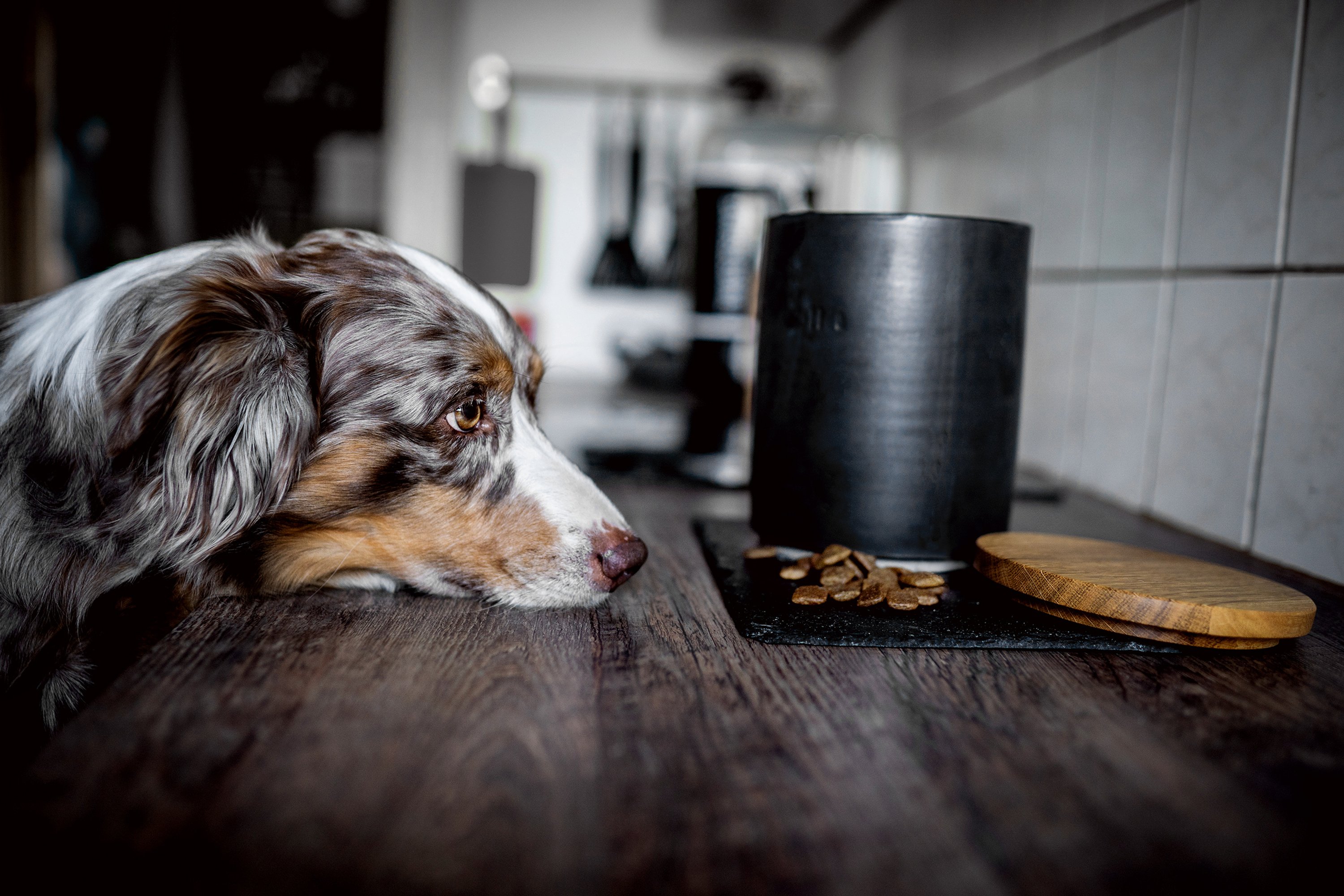These substances are toxic for your dog
Maybe you know the problem: You have leftovers and would love to give them to your four-legged friend, who stares at you with big Bambi eyes. But which foods are dogs allowed to eat at all? Just because it's good for humans doesn't mean our dogs can get the same added value from it. Many substances cannot be broken down properly in the dog's metabolism, or only at a slower rate, and a well-intentioned snack ends in digestive problems or even poisoning of the four-legged friend.
But not only food can harm our dogs. Plants, medicines, or substances from the cleaning cupboard can also have a negative effect on the dogs' well-being.
In this article we will answer all relevant questions about the topic: What is poisonous for the dog? In addition, we show you how you can prevent poisoning, what signs of poisoning can be, and how you should act in the event of poisoning.
How can I prevent my dog from eating something poisonous?
The German Federal Veterinary Association compares the handling of the dog in the household with that of a small child: Medicines, cleaning agents or other potentially toxic substances should definitely be kept out of the dog's reach. But what about outside the household, or with a dog that does not stop at doors and cupboards?

Impulse control and obedience
Train impulse control with your dog as early as possible. The dog should be able to control emotions and impulses, and not pounce enthusiastically on food lying around. This of course applies both indoors and outdoors. The dog should learn that, as a matter of principle, nothing should be eaten that does not come from the hand of its owner, even if it is a tempting sausage roll at the bus stop.
Nevertheless, even a dog with high impulse control should always be careful. Poison baits are a difficulty for many dogs, because they are often prepared to attract even the most obedient dog.

Leash handling
Especially in areas where there have been increased warnings for toxic substances, such as poison bait or rat poison, it is recommended to keep your dog on a leash.

Muzzle
Dogs that have problems with impulse control benefit from a muzzle outside. Often you can not look fast enough, until the dog has already pulled something out of the bushes. Here a muzzle can be a good aid to prevent poisoning by unknown substances. You want to know more about muzzles for dogs? Here you can find our blogpost about it!

Storage
Keeping out of reach: All substances that can have negative effects on your dog's health should always be kept out of his reach. Since for many dogs the storage on a table or a chest of drawers is no obstacle, especially if they are alone in the room, all incompatible materials should be stored behind a (cabinet) door or a height that is inaccessible for the dog.
Important: Please do not hesitate to contact your veterinarian if you have any questions. If your dog has eaten something and you feel unsure, consult your veterinarian rather once too often.
What are signs of a poisoned dog?
Not every poisoning causes external symptoms in dogs. Likewise, signs of poisoning can occur immediately after ingestion, as well as a long time later. You will find the classic symptoms of poisoning below, which phenomena which substance can cause, you will find after the next subtopic.
- Vomiting
- Diarrhea
- Apathy
- Restlessness
- Stomach ache
- Fever
- Breathing difficulty
What to do if the dog was poisoned?
The German Federal Veterinary Association recommends that a veterinarian be consulted as soon as possible. In the event of poisoning, laypersons would rarely be able to provide targeted help, which is why contacting a veterinarian as quickly as possible can be essential.
It is important that you remain calm and do not cause your dog additional stress. Show him that you are there for him and be a support for him.
Under no circumstances should you try to make your dog vomit. Foods that popularly promote vomiting can, in the worst case, accelerate the effect of the toxins. If we humans want to induce vomiting in ourselves, we often resort to the tried and true method of sticking our finger down our throat. This is not an option with dogs: dogs cannot be made to vomit in this way, and even if they are, any toxic stomach contents that arise can also cause more damage here.
If your dog is no longer conscious, lay him on his side. Make sure that his head is positioned so that he cannot choke on his saliva or vomit.
Many dog owners would love to shower their four-legged friends with love - and food. Often they even look in their own cupboard for this, because what is good for the human being must also be good for the dog, right?
This question can clearly be answered with no. Many substances that are present in our food are highly toxic for our pets, because they have no way to break them down. Even small amounts of an incompatible food can cause abdominal pain or diarrhea in dogs.
Under this section you will find a variety of foods that you should not feed your dog.
Chocolate contains the active ingredient theobromine, which is toxic to dogs. The dog can break this down very slowly in its body, or not at all. For this reason, dogs should not eat chocolate under any circumstances; dark chocolate in particular can cause great harm to dogs. Basically, dark chocolate contains the highest dose of theobromine, while white chocolate contains hardly any of the active ingredients.
If your dog has ingested a large amount of the active substance, do not hesitate to take him to the vet immediately. Because with a high dose it can also come to the death of the dog.
Symptoms: Diarrhea, vomiting, abdominal pain, seizures, tremors, cardiac arrhythmias, shortness of breath.
Lactose intolerance is a topic that also concerns many humans. Did you know that dogs also suffer from lactose intolerance? As with us humans, not every dog develops lactose intolerance in the course of his life. However, it is not atypical in adult dogs. They no longer have the enzymes necessary to digest dairy products properly.
Even dogs that are not lactose intolerant often have problems digesting dairy products. So at best, feed dairy products only in moderation and watch how your dog reacts to them.
Symptoms: Diarrhea, abdominal pain, flatulence
A number of foods are no problem for the dog's stomach when cooked. However, there are also raw foods that your four-legged friend should not eat under any circumstances. These include raw potatoes, lentils, beans, tomatoes and eggplants. Raw legumes, for example, contain toxic substances such as phasin. Feed these foods to your dog only if you have boiled them first, because this way you can make the harmful substances harmless.
Symptoms: vomiting, diarrhea, abdominal pain, neurological impairment, raw legumes can in the worst case lead to internal bleeding.
Grapes and raisins may contain the toxic substance oxalic acid, which can cause intolerance and even kidney failure in dogs.
Symptoms: vomiting, diarrhea
With stone fruit, such as cherries, apricots or peaches, the pit is particularly dangerous for your four-legged friend. Not only can the pit itself cause intestinal blockage, but chewing on the pit can release toxins such as prussic acid or prunasin.
Symptoms: vomiting, diarrhea, cramps, shortness of breath.
Just as with theobromine, which is found in chocolate, the dog's metabolism is not designed to process caffeine. Caffeine contains the active ingredient methylxanthine, which has a negative effect on your dog's nervous system. Even a small sip can cause restlessness and heart palpitations.
Symptoms: Racing heart, vomiting, restlessness, hyperactivity, seizures, tremors, cardiac arrhythmias, shortness of breath, cardiovascular arrest.
The consumption of alcohol can cause damage to the liver and kidneys in our four-legged friends.
Symptoms: vomiting, digestive problems, shortness of breath, coordination problems.
Onions and garlic contain active substances that attack your dog's red blood cells, which in turn are necessary for the oxygen supply of vital organs. In this case, it does not matter whether onions and garlic are raw, cooked or sautéed. These foods should not make it into the dog's body under any circumstances.
Symptoms: change in urine (e.g. blood in urine), vomiting, diarrhea
Of course, there are a number of spices, which are very good for the dog. However, especially salt or hot spices such as chili, pepper or nutmeg should be avoided. Salty foods increase the water requirement immensely, in addition, too much salt can also lead to kidney failure in the long run.
Symptoms: increased blood pressure, increased water requirement
Some people like to drink sweetener in their coffee, but it is not uncommon to find the sweetener xylitol in other foods as well, for example chewing gum or chewy candies. This can lead to a drop in blood sugar in dogs.
Symptoms: vomiting, diarrhea
Bacon can cause metabolic disease in your dog due to its fat content and can lead to kidney and pancreas problems.
Symptoms: digestive problems, metabolic disease
Raw pork can get the deadly Aujeszky virus. Infection with this virus is almost always fatal.
Symptoms: Brain and/or spinal cord inflammation, neurological impairment, convulsions, seizures

What plants are toxic to dogs?
Regardless of whether it is a wild or indoor plant, there are also substances that should not make it into the dog's stomach. Basically, the risk that dogs poison themselves on a plant is rather low, because the majority of dogs - except for grass on the side of the road - rarely go to them.
Nevertheless, it is of course only advantageous if you still have an overview of which plants your darling should avoid.
You should be careful, however, especially with puppies, which, due to their curiosity and playfulness, have more of a tendency to enjoy plants.
- Wild plants: Foxglove, wolfsbane, mistletoe, tulips, laburnum, yew, angel's trumpet, belladonna, lily of the valley, buckwheat, ivy
- Houseplants: Rubber tree, ficus, ivy, window leaf, hydrangea, orchids, poinsettia, geranium, flamingo flower, agave.
Symptoms: digestive problems, restlessness, shortness of breath, apathy, tremors
Medication
What other substances are toxic to dogs?
Although veterinary medicine occasionally makes use of the medications of human medicine, this does not mean that dogs should be given our medications without consulting a veterinarian. This is because our four-legged friends have a completely different metabolism than we do. So always make sure to store your medications safely, because many dogs make it their mission to take their owners' medications. In this case, even the nightstand is often not much of an obstacle.
It is important to note that dogs do not always show symptoms of poisoning when they have swallowed one of the dangerous pills. So pay special attention to whether your dog has stolen your tablet pack.
Basically, without consultation with the veterinarian, all drugs from human medicine can be dangerous for the dog. Thus, especially painkillers, antidepressants, sleeping pills and tranquilizers, ADHD drugs, beta-blockers and hormones, introduced by the birth control pill or thyroid medication, are a no-no.
Below we have summarized the effects in the dog of the most common drugs in human medicine:
May cause gastric ulcers, internal bleeding, and kidney failure. Typical symptoms of poisoning include vomiting, diarrhea, bloody feces, abdominal pain or even neurological disorders and increased urination.
May cause liver failure or damage to red blood cells. Symptoms of poisoning often manifest as diarrhea, vomiting, shortness of breath, or gastric bleeding.
Aspirin contains salicylic acid, which can lead to mucosal damage and thus to organ failure. In a majority of dogs, aspirin poisoning is manifested by (bloody) vomiting. However, diarrhea, fever, respiratory distress and apathy may also be symptoms.
Sedatives often have a calming effect on the dog, but in some cases they become very agitated after ingestion and show an opposite effect. A high dose can lead to increased or even low blood pressure and cause weakness and circulatory collapse.
Antidepressants usually quickly show symptoms of poisoning in dogs. These include, for example, respiratory distress, respiratory arrest, fainting and movement disorders.
The hormones in birth control pills can cause a big mess in your dog's body. Taking them can cause diarrhea, vomiting, stomach upset, and circulation problems. It can also cause liver failure in rare cases.
other toxic substances for your dog:
- Detergents and cleaning agents
- Antifreeze
- Solvents
- Cigarette butts
- Rat poison
- Chewing gum
- Paints and varnishes

